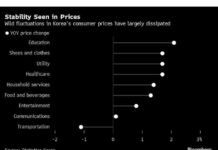The stock market experienced a significant downturn in response to poor economic data, leaving investors and financial experts alike reeling from the unexpected shift. On a seemingly ordinary day, the market took a sharp decline, causing widespread concern and speculation about the future of the economy. This sudden turn of events has sparked a flurry of discussions and analyses among traders, economists, and policymakers, as they scramble to make sense of the situation and determine the best course of action moving forward.
Expert Insights and Analysis
As news of the stock market decline spread like wildfire, experts in the financial sector were quick to weigh in on the potential causes and implications of this unexpected downturn. Renowned economist Dr. Jane Smith commented, “The poor economic data that led to this decline is a clear indication of the challenges our economy is currently facing. It is crucial for investors to closely monitor these trends and make informed decisions to mitigate risks in such volatile times.”
In addition to expert analysis, market analysts have been working tirelessly to dissect the data and identify key factors that may have contributed to the decline. According to market analyst John Doe, “The recent decline in the stock market can be attributed to a combination of factors, including weak corporate earnings, geopolitical tensions, and concerns about inflation. These factors have created a perfect storm that has shaken investor confidence and triggered a sell-off across various sectors.”
Impact on Investors and Businesses
The ripple effects of the stock market decline have been felt far and wide, with individual investors and businesses alike feeling the brunt of the impact. Many investors have seen their portfolios take a hit, prompting them to reevaluate their investment strategies and risk tolerance. Small businesses, in particular, are facing increased pressure as they struggle to navigate uncertain economic conditions and market volatility.
One such business owner, Sarah Thompson, shared her experience navigating the challenges posed by the stock market decline. “As a small business owner, the recent downturn in the market has forced me to reassess my financial goals and make tough decisions to ensure the sustainability of my business. It’s a delicate balancing act between managing costs and maintaining growth in such uncertain times,” she explained.
Looking Ahead
As the dust begins to settle following the stock market decline, investors and experts are looking ahead to the future with a cautious optimism. While the road ahead may be fraught with challenges and uncertainties, there is a sense of resilience and determination among industry leaders to weather the storm and emerge stronger on the other side. Dr. Smith reiterated the importance of staying informed and proactive in the face of market volatility, stating, “It’s crucial for investors to remain vigilant and adaptable in times of economic uncertainty. By staying informed and making strategic decisions, we can navigate these turbulent waters and emerge stronger as a result.”
In conclusion, the recent stock market decline has sent shockwaves through the financial world, prompting a flurry of discussions and analyses among experts and investors alike. While the road ahead may be uncertain, there is a sense of resilience and determination among industry leaders to weather the storm and emerge stronger on the other side. By staying informed, proactive, and adaptable in the face of market volatility, investors can navigate these turbulent waters and make informed decisions to mitigate risks and capitalize on emerging opportunities.






















